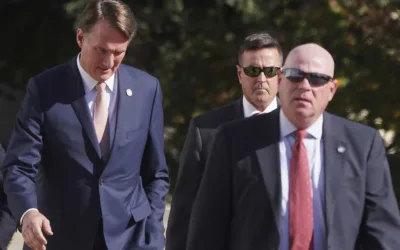
Incumbent and challenger debate what a Commonwealth’s Attorney should do in Richmond.
RICHMOND-What do Richmond residents need in a Commonwealth’s Attorney? What should his or her focus be? Incumbent Colette McEachin and challenger Tom Barbour raised those issues during a candidate forum this week at the University of Richmond’s School of Law.
McEachin and Barbour are competing in the Democratic primary on June 8. But with no Republicans challenging for the seat, the primary is basically going to be the election this year.
Both candidates framed many of their answers in relation to McEachin’s record as Commonwealth’s Attorney. McEachin was appointed interim Commonwealth’s Attorney in 2019, after serving in the Richmond office for nearly 20 years, and ran for the position unopposed later that year. Her husband, Donald McEachin, represents Virginia’s 4th district in the House of Representatives.
The Right to Protest
One of the major events of McEachin’s term involved last summer’s protests, which were sparked by the death of George Floyd at the hands of a police officer in Minneapolis. Barbour argued that McEachin’s focus during those incidents was in the wrong place.
“Last summer, the Commonwealth Attorney’s office prosecuted over 200 protesters, but was only able to secure an indictment of two police officers for criminal misconduct,” he pointed out.
Those indictments of two Richmond police officers came after a summer of protests that frequently featured what activists characterized as excessively violent responses from Richmond and State police.
McEachin responded by drawing a line between peaceful protests and riots, saying her office and the Richmond police worked to balance free speech and safety.
“Thousands of people attended [peaceful protests], and there were no arrests,” McEachin said. “And the reason there were no arrests is because we all know that there is a constitutional right to protest. And as long as all you are doing is protesting you are within your legal rights as a citizen.”
But during Black Lives Matter protests officers repeatedly attacked reporters, and in one incident fired tear gas into a peaceful crowd at Marcus-David Peters Circle. Richmond police chief Gerald Smith later called that event an “unwarranted action.”
One of the protesters’ key demands was the reopening of the Marcus-David Peters case, in which an unarmed Black man was killed by Richmond police while in the midst of a mental health crisis. McEachin’s office was widely criticized for refusing to reopen the case.
Barbour also criticized what he characterized as a lack of “public and transparent” guidance from the Commonwealth’s Attorney office on what offenses they would and would not prosecute during the protests. But he also went on to stress that he thought some violent acts – such as the burning of a bus last summer – should still be prosecuted fully.
Different Approaches to Reform
McEachin pointed to her success in promoting alternatives to incarceration during her time in office to support her nomination.
“We have multiple alternative dockets for mental health, for behavioural health at all levels of the courthouse,” McEachin said. “We also have one of the oldest adult drug courts in the commonwealth. And in the past couple of years over 150 people have gone through that drug court.”
Barbour questioned the efficacy of those programs, pointing out that they represented a small portion of overall prosecutions.
“I hear Ms. McEachin announcing new programming, but my understanding is that in the programming that does exist – the adult drug and mental health courts – enrollment is down.”
According to the Richmond Adult Drug Court, they enrolled 69 new clients in 2019 and 2020 combined, while serving a total of 196 clients over the same period.
During that period, the Richmond Police Department reported 3,454 drug offenses. That number includes repeat offenses and misdemeanor charges, but still represents a much larger portion of offenses than those diverted to the state’s drug court.
Barbour said that as Commonwealth’s Attorney, he would break from his predecessor’s policies on a number of fronts:
“Our city needs to take a fundamentally different, community-driven, social-services approach to public safety that’s systematically different from the way it’s done now,” Barbour said.
Much of Barbour’s campaign has focused on the need to end mass incarceration and reform the role of prosecutors. In contrast, McEachin struck a more reserved tone, stressing the need to protect victims.
“As a Commonwealth’s Attorney we have a duty to take care of those people who’ve been harmed, and we have an equal duty to make sure that what we do doesn’t harm those people who’ve been accused of committing a crime,” said McEachin.
The Role of the Commonwealth’s Attorney
Both candidates were asked about a man who was improperly arrested last week, after being mistaken by Capitol Police for another man with active warrants. The man was held for five days before being released without charges. The arresting officer now faces a civil suit as a result of the incident.
McEachin sidestepped the issue, saying it was a matter for the magistrate. “My office at that point does not know that the person has been arrested and my office does not know about the magistrate’s determination.”
Barbour said he’d like to see some reforms to address the issue.
“I think the office does have an implied responsibility to build partnerships with pro-bono attorneys and law firms… to make sure that if something as major as this happens, people have access to civil legal recourse,” he added.
The Democratic primary will be held on June 8, with early in-person voting beginning April 24.

Here’s everything you need to know about this month’s Mercury retrograde
Does everything in your life feel a little more chaotic than usual? Or do you feel like misunderstandings are cropping up more frequently than they...

VIDEO: Check out Dogwood’s new merch line
Big news, Virginia! We've officially launched our Dogwood merch line 🎉 This year, we celebrate 5 years of bringing you Virginia news you can use....

VIDEO: Your support matters!
Your support matters! Donate today. @vadogwoodnews Your support matters! Visit our link in bio to donate today. #virginianews #virginia #community...

Op-Ed: Virginia’s new Democratic majorities pass key bills to improve your lives, but will Youngkin sign them?
The 2024 Virginia General Assembly regular session has wrapped up. It was a peculiar session from the outset, with Democratic majorities in the...

From the state rock to the state flower, here’s how Virginia got its symbols
Have you ever wondered why the Dogwood is the state flower? Or how the cardinal became the state bird? We’re here to answer those questions and more...

VIDEO: Second-gentleman Douglas Emhoff gives speech on reproductive freedom
Second gentleman, Douglas Emhoff touched on reproductive freedom not only being a woman's issue but "an everyone's issue" during the Biden-Harris...




